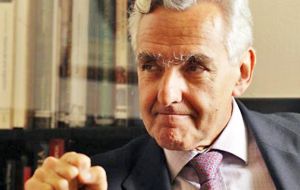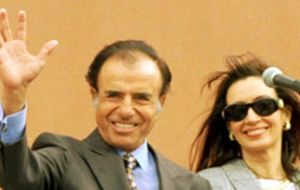MercoPress. South Atlantic News Agency
AMIA/Nisman: a situation of unpredictable consequences, says Rosendo Fraga
 “Institutional crisis” because Executive-Judiciary relations in Argentina have never been worse since the return of democracy in 1983, argues Rosendo Fraga
“Institutional crisis” because Executive-Judiciary relations in Argentina have never been worse since the return of democracy in 1983, argues Rosendo Fraga  With Menem and Cristina Fernandez connections to Syria and Iran, Argentina is the Latam country most linked to the Islamic fundamentalism conflict
With Menem and Cristina Fernandez connections to Syria and Iran, Argentina is the Latam country most linked to the Islamic fundamentalism conflict  Pope Francis concern about Argentina's governance after all is not exaggerated but rather well founded
Pope Francis concern about Argentina's governance after all is not exaggerated but rather well founded The death of special prosecutor Alberto Nisman puts Argentina in a situation of unforeseeable outcome in which converge foreign policy, institutional functioning and local politics, according to Rosendo Fraga one of the country's most respected political analysts.
In his column Fraga points out that the same weekend that Nisman was found dead, in the Golan Heights an Israeli missile killed five leaders of the Islamic Shiite Hezbollah organization, one of the them the youngest son of Imad Mughniyah, who was accused of having participated in the bombings of the Israel embassy in Buenos Aires in 1992 and two years late in the AMIA attack. Imad Mughniyah was finally killed in an explosion in Damascus in 2008.
Although Latin America is the world's region less involved in the Islamic fundamentalism terrorism conflict, nonetheless Argentina is in effect the most linked: first with Carlos Menem in 1989 and his Syrian connections, and now in Cristina Fernandez second period with Iran. In both cases the two countries are strong allies of Islamic Shiite and both openly support Hezbollah.
Thus given this background and the charges presented by prosecutor Nisman regarding the alleged 'Iran cover up plot' involving the Argentine president, a minister, a lawmaker and two Kirchnerite militants, plus the death of the prosecutor the night before he was to support his charges before Congress, makes it the most serious situation faced by Argentina as a consequence precisely of its international relations.
At the same time according to Fraga, it's an 'institutional crisis' since it happens at the worst moment of relations between the Executive and Judiciary branches since the return of democracy in 1983. The fact that the Executive is accused by a special prosecutor that has been working for ten years specifically on an only case (AMIA), of a cover up operation to benefit Iran, the alleged main culprit in the case, with false evidence, of the worst terrorist action Argentina's territory is “a most serious institutional crisis”. And so is the fact that the prosecutor could never make it to Congress, after having publicly warned his life was at risk, and no matter if the government stated the man committed suicide.
Another institutional issue is the fact that behind the Nisman presentation is an unprecedented conflict in Argentina's intelligence services, which first surfaced when President Cristina Fernandez sacked the Secretariat chief and implemented a purge of agents and staff, among which several that had been working with the prosecutor in the AMIA case. In the time span from Nisman's charges and his death, all of the intelligence people purged were sent to early retirement.
But according to Fraga there is also a political ingredient in the last year of Cristina Fernandez second period and twelve and a half years of Kirchnerite rule, 'the unexpected factor'
In effect only a month ago the Argentine government had all radars on the lookout for a possible new round of end-of-the-year looting; summer economic volatility as has happened in one of three years for the last three decades, including 2013; bad news from Federal Judge Thomas Griesa in New York and the dispute with holdouts; further corruption charges against the Kirchner family and cronies or even the health situation of Cristina Fernandez, quite deteriorated lately.
But what was never expected in the last year of this government was a crisis of such magnitude related to the AMIA case involving foreign relations and the political and institutional situation of Argentina.
2015 is presidential election year, and at first sight seems to favor the opposition over the government. It could mean that at the end of this year the final chapter of Argentina's history and Islamic fundamentalism could begin to come to an end, during the next four years, depending who wins next October.
Last but not least Fraga points out that this year's political transition won't be easy and maybe Pope Francis concern about Argentina's governance in this period is after all not exaggerated but rather a well founded concern.
In two centuries of Argentine history never an issue with strong foreign roots had become a domestic political crisis of such magnitude, and most probably can be described as he most delicate political moment faced by Kirchnerism in more than a decade in office.




Top Comments
Disclaimer & comment rules-

-

-

Read all commentsWhat a bunch of tripe. What is unforeseeable? The logical consequences of the perronista political/economic pillaging of the country . . . .
Jan 21st, 2015 - 08:04 am 0CD2's worst fears - the destruction of Argentine society, by 'you know who'!
Jan 21st, 2015 - 08:08 am 0I think for the ongoing health of TMBOA somebody should “loan” her a 0.22rf lr BERSA SA pistol ASAP.
Jan 21st, 2015 - 10:22 am 0That would solve such a lot of problems.
Commenting for this story is now closed.
If you have a Facebook account, become a fan and comment on our Facebook Page!